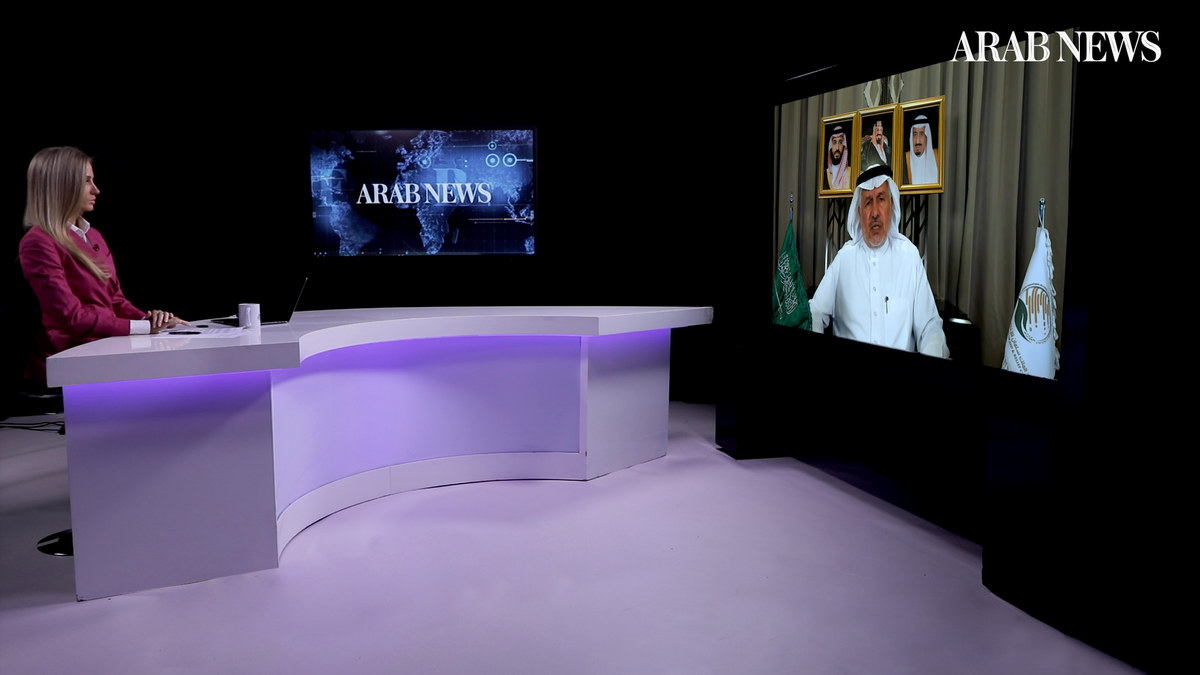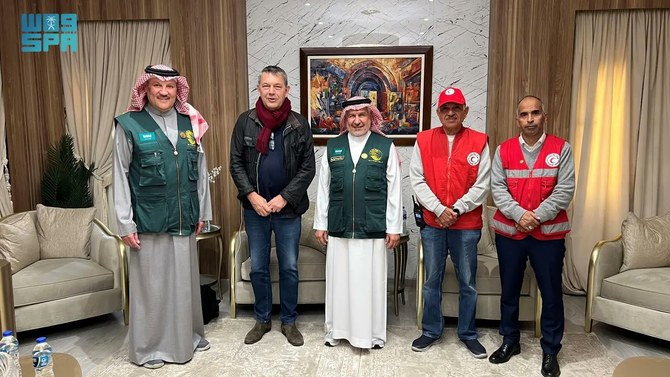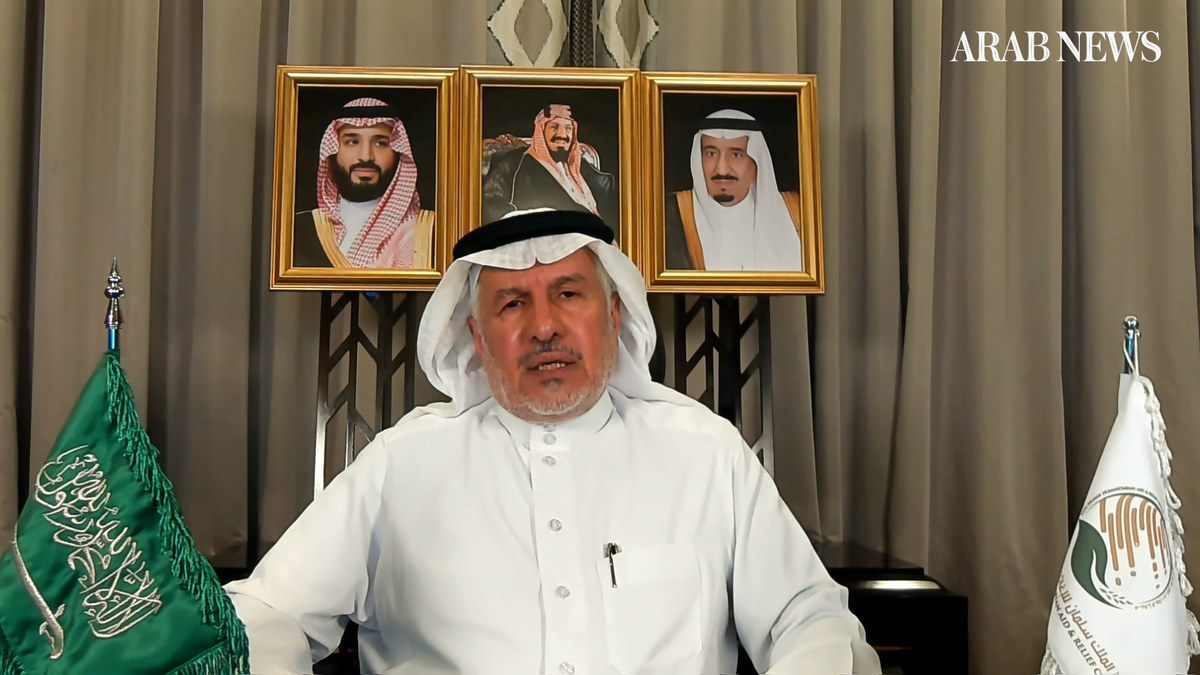DUBAI: The outpouring of support to Gaza from both the Saudi government and people has demonstrated the Arab world’s commitment to helping Palestinians, Dr. Abdullah Al-Rabeeah, supervisor general of Saudi aid agency KSrelief, has said.
He suggested one need look no further than the figure of more than SR536.25 million ($143 million) already collected in donations for the beleaguered Gaza Strip through Saudi Arabia’s Sahem platform, which allows Saudis to donate directly to KSrelief’s projects.
“Nobody can deny the evidence and the numbers, and I think the Sahem platform is seen by the world,” Al-Rabeeah, who is also a skilled pediatric surgeon and adviser to the Saudi Royal Court, told the latest episode of “Frankly Speaking,” the Arab News’ weekly current affairs show.
The chronically poverty-stricken and food-insecure Gaza Strip was in serious need of humanitarian and development aid even before the conflict between Israel and Hamas erupted in early October.
Bombardment of the region by Israeli forces began on Oct. 7 after a series of Hamas attacks on and kidnappings in Israel. According to health officials in Gaza, more than 15,000 people, most of them civilians, have lost their lives in the enclave since that day.
With Israeli airstrikes showing no signs of abating and the humanitarian situation deteriorating, King Salman and Crown Prince Mohammed bin Salman announced on Nov. 2 the start of a fundraising campaign for Gaza via Sahem.
In just five days, the donations had exceeded SR375 million. King Salman and Crown Prince Mohammed bin Salman themselves donated SR30 million and SR20 million, respectively.
The sheer amount of donations — “one of the largest and quickest fundraising campaigns” in the long history of Saudi Arabia’s humanitarian efforts — flies in the face of many media reports that suggest that the Arab world does not care about Gaza.

Al-Rabeeah told Frankly Speaking that Israeli authorities have put limitations on the number of aid trucks and implemented a lengthy inspection process, causing potentially deadly delays in the delivery of food, shelter, and medicine. (AN Photo)
“We haven’t stopped yet,” Al-Rabeeah told Katie Jensen, the host of “Frankly Speaking,” on the subject of giving. “We have exceeded 1 million donors, which reflects the response of the people and their passion about the civilian situation and humanitarian situation in Gaza.”
The donations will continue to increase over the coming period, he said, adding that the record-breaking amount does not include in-kind donations.
He said: “Our businessmen have donated ambulances, medical equipment, food supplies, nutritious food and formula for children. These are not reflected on the platform, so we’re talking about a lot of donations.”
The first batch of Saudi aid arrived in Port Said on Nov. 25, with more than 1,000 tons of food, medical supplies, and shelter materials making its way towards Gaza.
The third relief ship departed from the Jeddah Islamic Port on Saturday, carrying 300 large containers, or 1,246 tons, of food, medical help, and supplies for shelter.
The first Saudi relief plane left Riyadh for Egypt’s El-Arish Airport on Nov. 9, carrying 35 tons of aid. By Dec. 1, KSrelief had operated its 24th aid relief flight for Gaza, which carried 31 tons of food and shelter materials.
While there is certainly no shortage of material support for the people of Gaza, Al-Rabeeah has denounced the processes that Israeli authorities have imposed before aid deliveries reach the Gaza Strip.
“The situation is challenging,” he said, drawing on his observations during recent visits to El-Arish Airport, where Saudi aid destined for Gaza arrives, and the Rafah crossing, the only border crossing between Egypt and Gaza.
He noted that aid trucks “have to go more than 50 kilometers to be examined and cleared by the Israeli forces, and then come back 50 kilometers.”
He added: “The assessment takes days to clear each truck. And then they must go through the Rafah corridor. This by itself is a significant challenge. It’s delaying the aid for those who are in extreme need.”
Al-Rabeeah said that despite the UN saying that Gaza requires a minimum of 400 trucks of aid per day, Israeli authorities were only allowing a maximum of about 140 each day.
These obstacles can be a matter of life and death, he said, pointing out that particularly vulnerable people, such as pregnant women, children, the elderly and the injured, cannot afford delays.

Dr. Abdullah Al-Rabeeah, supervisor general of KSrelief, met with Philippe Lazzarini, commissioner-general of UNRWA, in Egypt. (SPA)
He said: “We’re talking about life by the minute. So, any delay means, as far as I’m concerned as a doctor, a risk of death.
“We have to gain every minute, we have to gain every hour, and we have to allow as many trucks (as we can) that are carrying nutrition for children, food for adults, and also medications that will maintain life.”
A more severe and obvious danger is present on the ground, one which Al-Rabeeah said is preventing Saudis from doing more to aid Palestinians.
Multiple reports from academics, humanitarian aid agencies and media groups have accused Israeli forces of killing healthcare and aid workers in Gaza, by targeting shelters, refugee camps, hospitals and ambulances.
Not even the UN has been spared Israeli targeting, with the organization reporting the deaths of more than 100 workers from the UN Relief and Works Agency for Palestine Refugees since the Israeli military operation began in October.
Al-Rabeeah said: “For me, it is (painful) to see anybody attack and deliberately actually kill aid workers or health workers, or attack hospitals or even mosques, churches — you name it.
“Those acts are against all rules that we know of, against international humanitarian law, against also the principles of human beings. We hope that those attacks will stop immediately and no civilian, or health worker, or humanitarian worker is attacked or targeted.”
If their safety is guaranteed, he said, KSrelief was ready to send volunteer healthcare workers to help save lives in Gaza.
He added: “If the security situation allows, my team will be more than happy to go to Gaza and ensure that those people who are in dire need will receive the aid. We also want to see that the distribution (of aid) is appropriate.”
Despite the hurdles to be overcome, local and regional authorities are doing their best to facilitate humanitarian deliveries, according to Al-Rabeeah.
KSrelief has signed agreements with multiple international agencies, including UNRWA, the World Food Programme, the World Health Organization, and the International Committee of the Red Cross.
He added: “We have teams also in El-Arish who are located there to coordinate with the UN agencies, international agencies and regional agencies such as the Egyptian Red Crescent and the Palestinian Red Crescent.

Al-Rabeeah said Egyptian authorities had been very cooperative and had been instrumental to the work of KSrelief. (AN Photo)
“The flights are continuing from Riyadh to El-Arish daily, as are the shipments by sea. We have plans to keep those ships going on, and the flights going on, to ensure that we have enough supplies close to the corridors so that we can access them as quickly as we can.”
KSrelief and the Egyptian Red Crescent on Nov. 23 signed a memorandum of understanding for the cooperation of aid delivery to Gaza, facilitating the sending of aid by land and air routes.
Al-Rabeeah said: “The Egyptian authorities have been very cooperative. They have been instrumental to our work, and they have helped us a lot, either at El-Arish Airport or at the sea port of Port Said.”
He added that KSrelief had held multiple virtual meetings with the Palestine Red Crescent Society and UNRWA “to ensure that their … logistic needs are met.”
In addition to coordinating the massive undertaking of supporting Gaza with aid, Al-Rabeeah has a personal connection to the region.
He has performed dozens of operations in the last 30 years to separate conjoined twins as part of the Saudi Program for the Separation of Conjoined Twins, and in the process has helped make the Kingdom the world’s leader in such surgeries.
One such case is that of “Baby Haneen,” who was separated from her twin sister Farah by Al-Rabeeah in 2018 after they were permitted to travel to Saudi Arabia for the procedure. Farah died, but Haneen went on to recover after returning to Gaza.
The Palestine Children’s Relief Fund reported that Haneen was alive and well in May this year, but her fate is now unknown.
Al-Rabeeah said: “Now I am not sure as of today whether Haneen is alive, whether her parents are alive, or all of this work that has been done by Saudi Arabia has been lost.
“It’s painful for me until I know that Haneen and her parents are alive.”




























